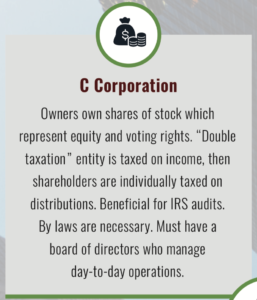Cannabis Business LLC Taxed as a C Corporation: Why?

For many business owners, a cannabis business LLC is the preferred type of business entity because it’s generally cheaper and easier to set up.
You can structure it to be member-managed or manager-managed, and it avoids the “double taxation” that C-Corporations are subjected to.
Need help structuring your cannabis business? Request a consultation now.
How is a Single-Member LLC Taxed?
Traditionally, a single-member LLC is taxed as sole-proprietorship.
This means the business owner files a Schedule C on their personal income tax return that reflects the income they made from the business.
The business’ earnings are then visible on the corporate tax return.
Multi-member LLCs are taxed as partnerships, and Schedule K-1s are filed for each member to reflect their share of business income.
Both of these allow for the business income to flow through the company to the owners.
Therefore, their income is only taxed once at the owner level.
However, the cannabis industry is notorious for being the exception to the general rule.
Additionally, there are scenarios in which the flow-through LLC taxation model may not be in the best interest of a cannabis company or its owners.
In such cases, a cannabis business may prefer to elect C-Corp taxation by filing IRS Form 8832.
Need help structuring your cannabis business? Request a consultation now.
Why We Recommend C Corporations
 The main reason why we advocate for a C Corporation tax election is to reduce the amount of information that is subject to an audit by the Internal Revenue Service (IRS).
The main reason why we advocate for a C Corporation tax election is to reduce the amount of information that is subject to an audit by the Internal Revenue Service (IRS).
The IRS believes that cannabis businesses, even in states where marijuana is legal, are “special interest” groups.
This means that they’re audited at a higher frequency than other industries.
For that reason, the IRS started auditing cannabis companies regularly.
This is why you should perform your own tax audit to check that everything is in order.
That said, it’s always possible to register your business as an S-corp.
Since S-corporations are pass-through entities, they don’t pay corporate tax.
Many LLCs tend to choose to file IRS Form 2553 to have their company taxed as an S-Corporation and in turn, lower their taxes.
Need help structuring your cannabis business? Request a consultation now.
Preparing for Cannabis Audit by IRS
It’s no surprise that audits can lead to additional tax penalties or assessments.
This is especially due to IRS Section 280(E).
280e states that cannabis businesses can’t claim business deductions on their taxes.
This is in exception to cost of goods sold (COGS).
However, this provision creates a much higher tax burden on cannabis companies.
Therefore, this can lead to increased tax liability if not calculated correctly.
When the IRS audits an LLC with standard flow-through taxation, the audit starts at the entity level.
It then flows through to the owner’s personal finances.
However, if the LLC elects a C-Corp for taxes, the audit generally stops at the entity level.
This means that the auditors can’t continue the audit into your personal finances.
Since LLCs are subject to tax at both levels, this tax election allows for some protection against audits.
Need help structuring your cannabis business? Request a consultation now.
Selecting a C Corp Tax Election For Your Cannabis Business LLC
Your tax filings are serious business. Therefore, you should only consult a skilled cannabis attorney and CPA.
Before making elections, you need to seek counsel from your Certified Public Accountant (CPA) or cannabis attorney.
Need help structuring your cannabis business? Request a consultation now.
Categories
Cannabis Legal Group Free Consultation
Get in Touch With Michigan's Most Trusted Cannabis Law Firm
We’ve Been Helping Michigan Marijuana Businesses Lay the Groundwork for Long-Term Security and Success for Years, and We Can Help You, Too.
Phone Number:
(248) 301-0626
© Cannabis Legal Group. All rights reserved.

